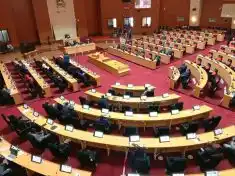
As the Parliament of Malawi adjourns sine die after an intense eight-week session, it is a moment of reflection for many, particularly for those members of Parliament (MPs) who will not return to the hallowed halls of legislative power.
The 51st Session, which commenced on February 14, 2025, has been a significant chapter in the political landscape of Malawi, but for some, it marks the end of their political journey.
The impending elections loom large, and the reality is stark: many MPs will not be returning to their constituencies, not because they lack the ambition or desire to serve, but because they have let their constituents down over the past six years.
The past six years have been tumultuous for Malawi, characterized by political strife, economic challenges, and a growing disillusionment among the electorate. The constitutional mandate of a five-year term was extended to six years, a decision that has left many feeling betrayed.
This extension was not merely a technicality; it represented a significant deviation from the democratic principles that underpin our governance. For many MPs, this period has been marked by a failure to deliver on promises, a lack of accountability, and a disconnect from the very people they were elected to serve.
As we bid farewell to these members, it is essential to acknowledge the impact of their actions—or inactions—on the lives of their constituents.
For those MPs who will not be returning, the reasons are clear. Constituents are tired of empty promises and political rhetoric that fails to translate into tangible benefits.
The electorate has become increasingly aware of the importance of holding their representatives accountable.
They have witnessed firsthand the consequences of poor governance, corruption, and a lack of transparency.
The trust that was once placed in these leaders has eroded, and as a result, many will find themselves on the outside looking in come election time.
It is a bittersweet farewell for these MPs. Some may have entered Parliament with noble intentions, driven by a desire to effect change and improve the lives of their constituents. However, the reality of political life often proves to be more complex.
The pressures of party politics, the allure of power, and the challenges of governance can lead even the most well-meaning individuals astray.
For many, the past six years have been a lesson in the importance of integrity, accountability, and the need to remain connected to the people they serve.
As we reflect on this period, it is crucial to consider the lessons learned.
The electorate is no longer passive; they are active participants in the democratic process. They are demanding more from their leaders and are willing to hold them accountable for their actions. This shift in mindset is a positive development for Malawi’s democracy, as it encourages greater engagement and participation in the political process.
However, it also serves as a stark reminder to those who have failed to meet the expectations of their constituents.
For the MPs who will not return, the time has come to invest in their future rather than spend on campaigns that are unlikely to yield results. The reality is that many of these individuals have already lost the confidence of their constituents.
Instead of pouring resources into a campaign that will ultimately be futile, it would be wise for them to redirect their efforts toward personal development, community engagement, or even exploring new career opportunities. Investing in oneself and the community can yield far greater returns than a political campaign that is destined for failure.
Moreover, this shift in focus can serve as a valuable lesson for those who remain in Parliament or for those who aspire to take their place. The importance of genuine engagement with constituents cannot be overstated.
It is not enough to simply show up during election season; true leadership requires a commitment to listening, understanding, and addressing the needs of the people. The electorate is looking for leaders who are willing to roll up their sleeves and work alongside them to create positive change.
As we say goodbye to these MPs, it is essential to recognize that their departure is not merely a loss for them but also an opportunity for renewal within the political landscape of Malawi.
New voices, fresh ideas, and a renewed commitment to public service can breathe new life into the Parliament. This transition can pave the way for a more responsive and accountable government that prioritizes the needs of its citizens.
In conclusion, the adjournment of Parliament marks a significant moment for reflection and renewal. As we bid farewell to those MPs who will not return, we must acknowledge the lessons learned from their tenure.
The past six years have been a wake-up call for both politicians and constituents alike. The electorate is demanding more, and it is the responsibility of those who seek to represent them to rise to the occasion.
For those departing, investing in personal growth and community engagement is a far more prudent choice than pursuing a political campaign that is unlikely to succeed.
As Malawi moves forward, let us hope for a new generation of leaders who are committed to serving the people with integrity, accountability, and a genuine desire to make a difference.






0 Comments